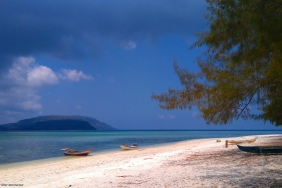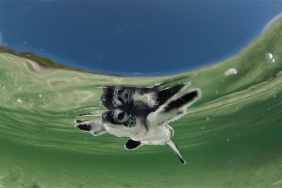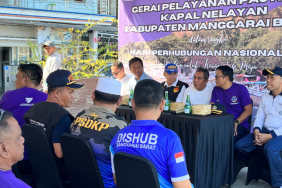POKMASWAS TRAINING: ACTIVATING SUPERVISION SYSTEM WITH COMMUNITY BASED IN SOUTH SORONG DISTRICT
The USAID SEA Project with WWF-Indonesia in West Papua had been conducted Community Monitoring Group Training (POKMASWAS) on 5-7 December 2018 at the M Kyriad Hotel, Sorong City, West Papua. The training participants are POKMASWAS members who come from the coastal area of South Sorong Regency, one of the areas being reserved as a Marine Protected Area (MPA) in West Papua Province.
POKMASWAS is a group formed to carry out supervision in the field by involving the community in order to monitor and control the usage of marine and fishery resources in responsible way. The role of POKMASWAS is stated in the Minister of Maritime Affairs and Fisheries Decree Number 58 of 2001 concerning Procedures for Implementing a Community Surveillance System in the Management and Utilization of Marine and Fishery Resources.
The existence of quite large potential coastal resources in South Sorong Regency is a challenge for the local government and the community in maintaining their source of livelihood. Since its inception, almost all POKMASWAS in South Sorong have not work their duties and responsibilities fully, where participatory supervision has not been intense. WWF-Indonesia's identification results found that most of the POKMASWAS management had not been structured, monitoring activities does not work and the members lacked ability to process information.
WWF-Indonesia seeks to strengthen the role of coastal communities in monitoring their resources, as well as supporting local governments in implementing monitoring programs so that the conservation areas that are formed later can run effectively. The training was attended by 21 participants from five POKMASWAS in South Sorong: Mesar Jaya, Klasaimus, Shrimp, Siganoi, and Kenaburi.
Facilitators for the POKMASWAS training included those from the SEA Project, KKP, DKP-PSDKP West Papua Province, and DKP-PSDKP Sorong. WWF-Indonesia also has role as co-facilitator in the training which takes place interactively with the participants. Participants were also taught how to send an SMS Gateway to the KKP if they encounter threats or acts of fisheries violations around them. Where through this system, reports from POKMASWAS members will immediately be followed up by the KKP to the implementing units in the regions.
Training participants are given an understanding of their roles and responsibilities as POKMASWAS members based on established standard operating procedures. "Even though the waters they own are quite extensive, the community knows very well the environment around them, so community participation in monitoring fishery resources is very important," said Eka Setiawan, a facilitator from the West Papua DKP-PSDKP.
Several fisheries issues in South Sorong are the use of Bore Roots from the tuba plant to catch fish which are not environmentally friendly, conflicts over utilization between native fishermen and migrant fishermen, reduced shrimp catches, and cutting down of mangrove forests are in the spotlight. in each participant discussion. These things are then used as a reference for POKMASWAS members to learn to identify priority issues in carrying out supervisory duties.
At the end of the training, participants are invited to develop an Action Plan that can be used as a reference for each group's work program to activate the POKMASWAS functions to surveillance and reporting violations around the conservation area.





